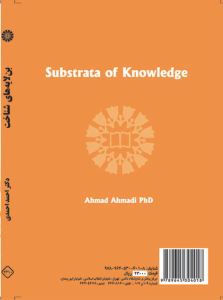The Basic Layers of Cognition
Dr. Ahmad Ahmadi
Epistemology is the study of knowledge which is concerned with the necessary and sufficient conditions of knowledge. In this exciting and original essay on “The Basic Layers of Cognition”, Dr. Ahmadi explains and criticizes traditional philosophical theories of the nature, limits, methods, possibility, and value of knowing. The traditional problems of epistemology in Islamic and Western philosophy from Avicenna and Allamah Tabatabaei to Descartes and Kant are explored and criticized, and the author’s own theories are presented.

The main purpose of this book is a very brief review of the basic layers of cognition. For this purpose, the first part of the book, entitled “Epistemology” is devoted to this subject. In this section, issues on the definition of knowledge; the essence of experience and the conceptuality of knowledge are discussed. In the chapter on the essence of attributive and necessary propositions, a critique of Kant’s views on the former and latter propositions and analytical and synthetic is explained. In the continuation of this section, discussions about umma al-qadhaya [Um al-qaḍāyā] or the principle of identity; propositioning, and how to de-epitomize it has been offered. The structure and essence of the conditional proposition; truth from the point of view of Ibn Sina, Kant, Popper and the author’s view were examined.
 The second part entitled “Ontology” focused on the discussion of causality. This section covers the definition of causality; Causality and ontology; the existential hypothesis is presented by discussing the originality of existence and the originality of essence. The last discussion is a study of the conflict between the originality of existence and the originality of essence which the author considers to be the product of confusion between epistemology and ontology. Finally, following the Mulla Sadra’s theory on Tashaun and Jaal, the author summarized a theory that, in his opinion, can response some of major challenges in Western and Islamic philosophy.
The second part entitled “Ontology” focused on the discussion of causality. This section covers the definition of causality; Causality and ontology; the existential hypothesis is presented by discussing the originality of existence and the originality of essence. The last discussion is a study of the conflict between the originality of existence and the originality of essence which the author considers to be the product of confusion between epistemology and ontology. Finally, following the Mulla Sadra’s theory on Tashaun and Jaal, the author summarized a theory that, in his opinion, can response some of major challenges in Western and Islamic philosophy.
